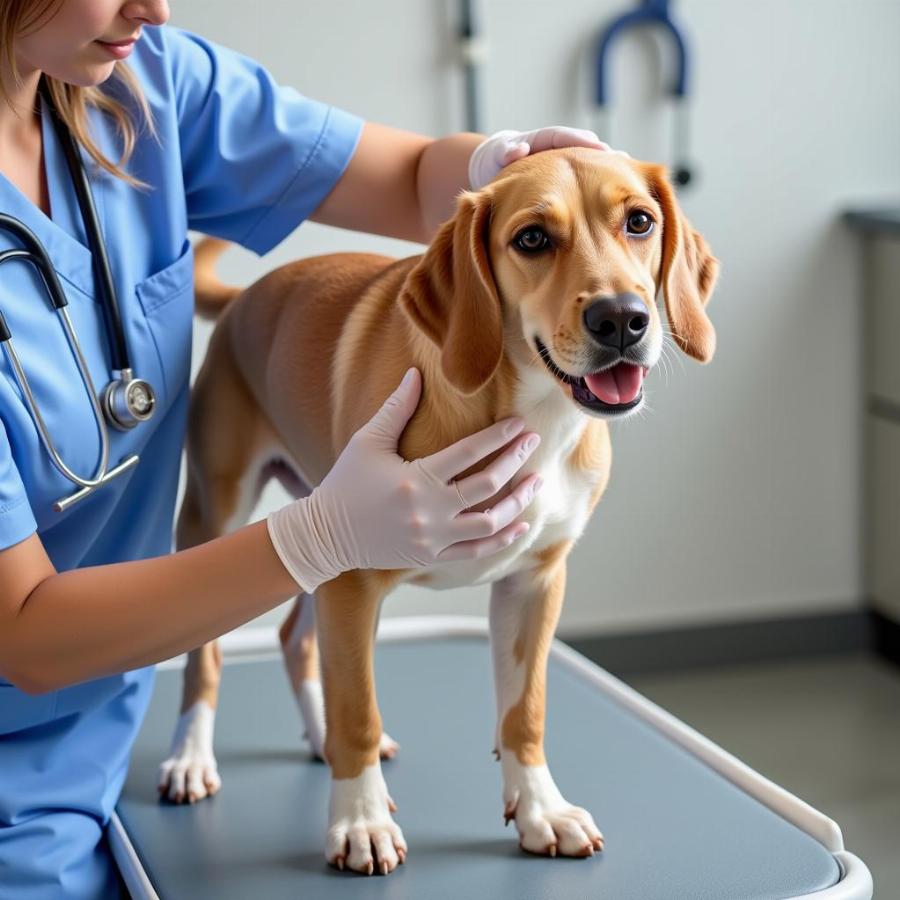Dealing with a dog anus gland abscess can be a distressing experience for both you and your furry friend. This painful condition requires prompt and proper treatment to alleviate discomfort and prevent further complications. Understanding the causes, symptoms, and available treatment options for dog anus gland abscesses is crucial for every responsible pet owner.
Understanding Dog Anus Gland Abscesses
Anal glands, also known as anal sacs, are small pouches located on either side of your dog’s anus. These glands secrete a foul-smelling fluid that typically empties during defecation. However, sometimes these glands can become impacted or infected, leading to an abscess. An abscess is a painful, swollen pocket of pus that forms under the skin.
Recognizing the Signs of an Anal Gland Abscess in Dogs
Several symptoms can indicate your dog is suffering from an anal gland abscess. These include scooting or dragging their rear on the floor, excessive licking or biting at the anal area, a swollen and painful area around the anus, and a foul odor. If your dog displays any of these signs, it’s essential to seek veterinary care immediately. Early intervention can prevent the abscess from worsening and potentially rupturing.
After this paragraph, please insert the following shortcode:
“
What Causes Dog Anus Gland Abscesses?
Several factors can contribute to the development of anal gland abscesses in dogs. These include impaction of the anal glands, bacterial infections, and underlying medical conditions that affect the immune system. why do dogs wipe their bum on the floor can provide more insight into some of the underlying issues. Certain breeds, such as Chihuahuas and Poodles, are also more prone to developing this condition.
Dog Anus Gland Abscess Treatment Options
Treatment for a dog anus gland abscess typically involves lancing and draining the abscess, followed by a course of antibiotics to clear up the infection. In some cases, a warm compress may be recommended to help soften the abscess and promote drainage. anal gland surgery dogs might be necessary in severe or recurring cases. Your veterinarian will determine the best course of treatment based on the severity of the abscess and your dog’s overall health.
After this paragraph, please insert the following shortcode:
{width=900 height=900}
How can I prevent dog anus gland abscesses?
While not all anal gland issues are preventable, there are some steps you can take to reduce the risk. Maintaining a healthy weight for your dog can help ensure proper anal gland function. Adding fiber to your dog’s diet can also help bulk up their stool, which can aid in natural anal gland expression. Regular veterinary checkups are crucial for early detection and treatment of any potential issues. how often do dogs anal glands need to be expressed is a helpful resource for understanding routine anal gland care.
Home Care for Dogs After Anal Gland Abscess Treatment
Following treatment, your veterinarian may prescribe pain medication and antibiotics for your dog. It’s crucial to administer these medications as directed. Keeping the area clean and dry can also help prevent reinfection. Your vet may also recommend warm compresses to soothe the area and promote healing.
What are the long-term implications of a dog anus gland abscess?
Recurring anal gland abscesses can sometimes lead to chronic inflammation and discomfort. In rare cases, surgical removal of the anal glands may be necessary. However, with proper treatment and preventative care, most dogs recover fully and experience no long-term complications.
“Regularly monitoring your dog’s anal gland health can prevent painful abscesses,” advises Dr. Emily Carter, DVM, a renowned veterinary specialist in canine health.
“Dietary adjustments and regular vet checks are key to managing anal gland issues,” adds Dr. Michael Davis, DVM, a leading expert in canine digestive health.
After this paragraph, please insert the following shortcode:
“
Conclusion
Dog anus gland abscess treatment is vital for your pet’s comfort and well-being. Understanding the causes, symptoms, and treatment options empowers you to provide the best care for your furry companion. By seeking prompt veterinary attention and following recommended aftercare instructions, you can help your dog recover quickly and prevent future occurrences. why is my dogs butt red can offer further insight into related anal gland issues.
FAQ
- How do I know if my dog has an anal gland abscess? Look for signs like scooting, excessive licking of the anal area, swelling, and a foul odor.
- What causes anal gland abscesses? Impaction, infection, and underlying medical conditions can contribute.
- How are anal gland abscesses treated? Treatment involves lancing, draining, antibiotics, and sometimes warm compresses.
- Can I prevent anal gland abscesses? Maintaining a healthy weight, adding fiber to your dog’s diet, and regular vet checks can help.
- What is the recovery time for an anal gland abscess? Recovery time varies but is generally within a few weeks with proper care.
- Are there long-term complications from anal gland abscesses? While rare, chronic inflammation or surgical removal of the glands may be necessary in some cases.
- When should I contact my veterinarian? Contact your vet immediately if you notice any signs of an anal gland abscess.
Related Questions and Further Reading
- How to express dog anal glands at home
- Diet recommendations for dogs with anal gland problems
- Understanding canine anal gland anatomy
Beaut Dogs is your trusted source for comprehensive and expert-driven information on all things dog-related. We’re dedicated to helping you navigate the world of dog ownership, providing reliable advice on everything from breed selection to health care. When you need support, please reach out to us via Email at [email protected] and Beaut Dogs will provide detailed and accurate answers to your questions. Visit https://beautdogs.com for more helpful resources.
